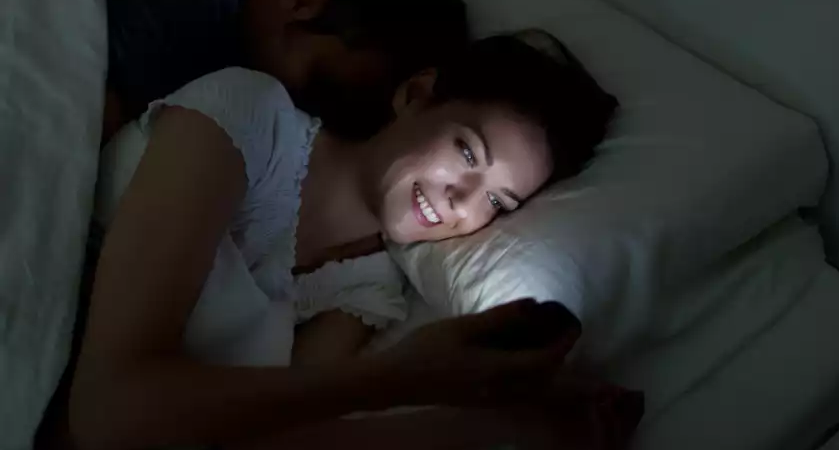
Did you hit ten o’clock in the evening or maybe two in the morning and still can’t sleep? Do you feel frustrated and anxious about your work early in the morning? How do you explain this?
There is a whole host of reasons that hinder you from getting a good and adequate sleep (such as stress, pre-menopause and coffee that you drank after dinner), however, there is a reason that is not mentioned in your mind: the light of your mobile phone!
Some new research has shown the mechanism of action of light-sensitive cells in the retina in controlling the internal clock, when exposed to light with its blue waves, as blue light has the greatest effect in this event, this research helped explain the mechanism in which sleep efficiency may be affected as a result Continuous exposure to light that is not synchronized with the internal biological clock, i.e. exposure to it at late hours at night.
The sleep cycle no longer follows the pattern of morning and evening as a result of our use of unnatural light sources and because of the development of technology and the increasing use of smart phones and others.
It is worth noting that the ordinary room lamp does not have the same blue light effect from smartphones and many electronics in your home. Health sleep specialist Northwell explains that blue light is a type of light with a certain wavelength of light spectrum, and does not appear blue to the naked eye It looks like a white glow, which emits a smartphone, iPad, laptop, e-reader and virtually all other electronic devices in your home, and you’ll also find it in fluorescent lights and LED lights.
Excessive exposure to any artificial light source can lead to sleep deprivation or poor sleep quality, however; blue light is a special problem; it is a hormone your body produces when it’s time to prepare for sleep.
But how does this happen?
Light-sensitive cells are not involved in transferring images to the brain. Instead, they sense levels of ambient light and then send signals to the brain according to levels of surrounding light. Inside these cells there is a protein called melanopsin that treats ambient light, and prolonged exposure to light may reshape this protein within cells.
The continuous regeneration of melanopsin leads to the sending of signals to the brain informing him of the conditions of the surrounding lighting. The brain uses this information to regulate sleep, alertness and awareness.
In other words, blue light keeps you alert, and Dr. Rajan says, “Blue light may interfere with the geometry of the sleep process as well, and lead to an imbalance in the deepest stage of sleep.” If you cannot reach the deepest stage of sleep, you will still feel tired even after you wake up.
What is the effect of the biological clock on the human body?
The main biological clock that regulates the 24-hour cycle is located in a region called (the nucleus) located above the sclerosis in the hypothalamic region of the brain, and its nerve fibers are sent throughout the body.
This nucleus is made up of two small groups of thousands of nerve cells that “tell time” based on external signals (such as light and dark). They regulate sleep, metabolism, and hormone production. The internal circadian rhythms control body temperature, heart activity, hormonal secretion, blood pressure, oxygen consumption, and metabolism of functions. Many others.
In addition to being involved in regulating both levels of sugar, electrolytes, and erythrocytes, our inner hour may affect our mood, causing depression, especially in the winter season known as seasonal affective disorder (SAD).
Getting adequate sleep and going to sleep in a timely manner helps her to perform her work in an optimal way, which led researchers to look towards modern treatments for insomnia, migraines and a biological clock disorder. A Spanish study found that people who were exposed to blue light at night were more likely to be infected Breast cancer or prostate cancer, and other research has linked the effect of blue light on metabolism may increase the risk of diabetes and obesity.
As for the effect of blue light on the eye, it has not yet been established, however; some research has suggested that, in the long term, it may alter the cells receiving light causing damage to the retina.
Now that we know the effect of light – especially blue – on our health, here are some ways to prevent its effects:
1- Reducing bedtime electronics:
Place the devices you carry near your face – like smartphones – away from you at least one hour before bedtime, they are worse than the TV that emits less blue light in addition to being far away, and you can use the blue light filter on your device or wear light blocking glasses Blue instead.
2- You can replace the typical white with light or bright blue with a light in red.
3- Hanging some curtains is a simple way to keep your room comfortable if street lights enter your bedroom.
0 Comments
Post a Comment